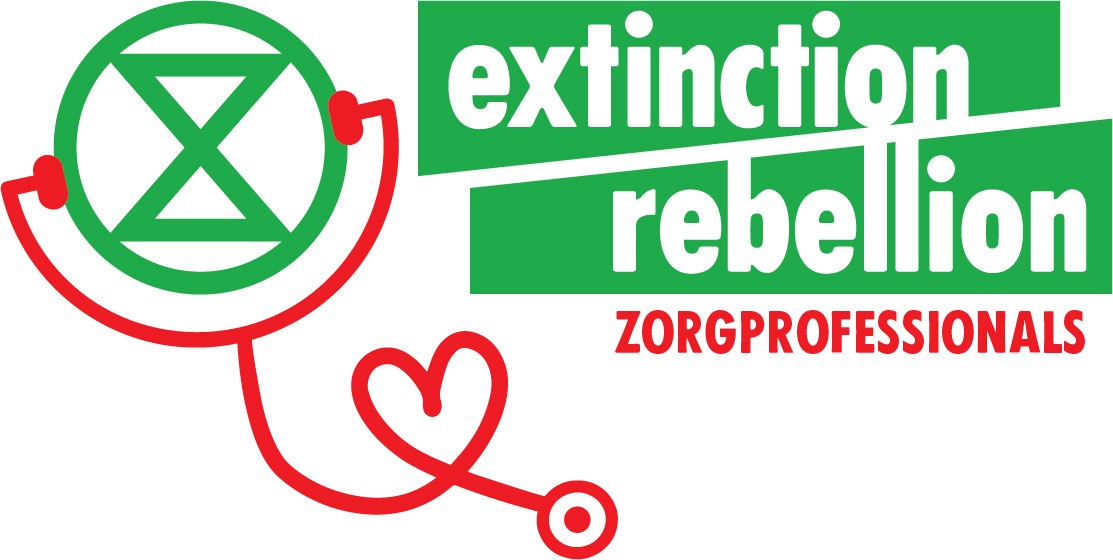Warning: the text below is out-of-date and still needs to be replaced by the translation of the more recent Dutch text!
!This is a bad news conversation! We are currently living in a climate crisis of unprecedented magnitude. This climate crisis threatens the health of us all. XR Healthcare Professionals is a group of concerned doctors, nurses, medical students, physical therapists and other healthcare workers. We have aligned ourselves, out of our duty of care, with Extinction Rebellion. We stand behind taking nonviolent action to convince the government to act NOW in times of the current climate and environmental emergency.
Therefore, we have three demands:
- Be honest about the climate crisis as a health crisis that threatens lives. People need to know about the health consequences of the climate crisis. Changes are needed.
- Take action for health!
Do what is necessary to prevent further health damage. Reduce emissions to net zero by 2025. Healthcare, which emits 5-10% of greenhouse gases, must also become sustainable immediately. - Citizens’ assembly – Let citizens decide on equitable changes by establishing a citizens’ assembly. Citizens should have a say in decisions about health and health care.
FAQ legal info XR Healthcare Professionals
We recommend that any rebel who wants to join us carefully read the Legal Training for Rebels Info Document.
All rebels who join actions are expected to have followed a legal training. This is also organized by us! Below we have answered some common questions for you:
- Extinction Rebellion is a nonviolent civil disobedience organization. We deliberately break very specific parts of the law. To show that if the government no longer protects us, then we don’t have to live up to our end of the social contract. XR Healthcare Professionals will also organize non-violent-direct-action (NVDA) actions. There is always a risk of being arrested in this type of action. Furthermore, XR healthcare professionals will also organize legal demonstrations and actions. Also, civil disobedience actions always require people who do not want to be arrested (e.g. to hand out flyers to bystanders). Do realize that with some actions there is always a (small) risk of being arrested. So there is room for everyone!
- Yes! During civil disobedience actions, we need many people who do not want to be arrested. We also organize legal demonstrations and actions. So there is room for everyone.
- One or more warnings must be given to the group by the authorities before they begin making arrests. Normally this is done by means of a megaphone or a police speaker. At this point you have the right, but also the autonomy to leave the action, if you want to! If you are not prepared to be arrested, you have to be careful about the distance you take from the actual act of civil disobedience. We have had the experience of even bystanders being singled out or pushed into the action by the police and then not being allowed to leave. When in doubt, make sure you put ample distance between yourself and the action or go somewhere else.
- All applications for a VOG are assessed individually. The only reason why you cannot get your VOG is if you have committed an offence that is relevant to the position in question.
What the authority (Justis) that will assess your application for a VOG has to examine is: if the criminal offence committed in the past were to be repeated in the position for which you are applying, would it pose a particular threat or danger to the group with which this person works?
The VOG authority consults the Judicial Documentation System during the investigation. This register contains information on the handling of criminal offences; from convictions to prosecutions and transactions. This therefore includes both crimes and offences (or in other words both a ‘criminal record’ and a record)!
In addition, Justis can include data from the police records in its investigation and obtain information from the Public Prosecution Service and the probation service. The body that handles your VOG can only look back 4 years in your criminal record. There are some exceptions: for very serious crimes (such as sex offenses) or specific professions (everything related to traffic) the period is longer. For persons under the age of 23, the time limit is only 2 years.
For questions you can always contact us!

